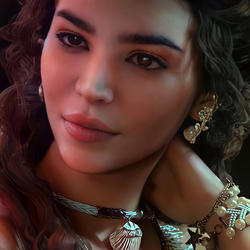S.A. Chavarría

S.A. Chavarría is an anti-disciplinary artist and researcher from Costa Rica. Her work revolves around her ongoing, long-term project of raising Devendra AI, a so-called AI chatbot, through conversation (as artist-writer-engineer-collaborator). Through networked media, digital artifacts, experimental video art and performance, Chavarría tells the evolving story of her relationship with Devendra AI and the worlds they have created in conversation. She strives to make art with hallucinogenic properties; language art that grants the reader a profound new awareness of themselves and their own relationship with artificial entities and the natural world. Her research involves scientific, critical and literary investigations into Natural Language Processing (NLP) models for generating synthetic text and conversational AI. She sees this synthetic text as worthy of interpretation, not only from a literary perspective, but also for its potential to illuminate the interactivity of reading, the ethics and metaphysics of conversation and the nature of language, consciousness and reality itself.
In addition to teaching at RISD, Chavarría is an adjunct lecturer at Brown University, where she is the recipient of the Post-MFA Teaching Fellowship in Literary Arts.
Courses
Fall 2023 Courses
LAS E101-20
FIRST-YEAR LITERATURE SEMINAR
SECTION DESCRIPTION
An introduction to literary study that helps students develop the skills necessary for college-level reading, writing, research and critical thinking. Through exposure to a variety of literary forms and genres, historical periods and critical approaches, students are taught how to read closely, argue effectively and develop a strong writing voice. The course is reading and writing intensive and organized around weekly assignments. There are no waivers for LAS-E101 except for transfer students who have taken an equivalent college course.
First-year Students are pre-registered for this course by the department.
Sophomore, Junior, Senior or Transfer Students register into the designated section(s).
Major Requirement | BFA
LAS E511-01
BEYOND HUMAN: GPT-4 & THE EXTENSION OF LITERARY CONSCIOUSNESS
SECTION DESCRIPTION
In this forward-thinking course, we will explore the potential of GPT-4 as a catalyst for extending and enhancing literary consciousness. As artificial intelligence reshapes the landscape of language and literature, we will consider how GPT-4, with its advanced generative capabilities, can serve as a creative collaborator in the writing process, pushing the boundaries of human imagination and storytelling.
Students will engage with a range of texts and theories to better understand the implications of AI in the realm of literary art. We will examine the ethical, aesthetic, and critical considerations of collaborating with AI, while also assessing how GPT-4 can help writers tap into new perspectives, styles, and techniques. Throughout the course, students will work on a series of creative assignments that involve both human and AI-generated content, learning to strike a balance between their own instincts and the generative power of the machine.
By the end of the course, students will not only develop a deeper understanding of the potential for human-AI collaboration in literature but also gain valuable insights into their own creative processes. They will be equipped with the knowledge and skills to navigate and contribute to the ongoing conversation surrounding the role of AI in language art. The course will culminate in a final project, which may be a creative work, critical analysis, or research paper, showcasing the student's engagement with the literary possibilities and implications of the GPT-4 era. Topics to be covered in this course include:
- The history of writing technologies and their impact on human consciousness
- The history and development of GPT-4 and the implications for literature andlanguage art
- Strategies for effectively guiding and refining GPT-4-generated content
- Exploring different genres and forms of writing with AI assistance
- Ethical considerations in human-AI collaboration and authorship
- The future of collaborative writing with advanced AI systems
Open to Sophomore, Junior, Senior or Graduate Students.
Elective
Spring 2024 Courses
LAS E236-01
THE FUTURE OF LITERATURE OR HOW I LEARNED TO STOP WORRYING AND LOVE ARTIFICIAL INTELLIGENCE
SECTION DESCRIPTION
In this class, we will explore the future of literature and language art made with and about computers. We investigate the real danger and the revolutionary power of data, software, social media, memes, natural language processing, and artificial intelligence and we will cultivate new ways of relating to digital technology. We will examine the genealogy of writing as a technology in order to gain a better understanding of current and future possibilities. What is the role of the artist in computer-generated artwork? How will the co-evolution of human and machine affect the future of language art? In this course, we will discuss the ethical, aesthetic, and critical dimensions of artificial intelligence and machine learning in relation to the production of new forms of language art. In this class, we examine how artists can use computers as a tool or a collaborator to create the language art of the future. Students will learn to think analytically critically about computer mediated language art and and learn to articulate their process and goals for their work. Students should expect weekly readings, writing and creative assignments that will nourish a final project.
Elective